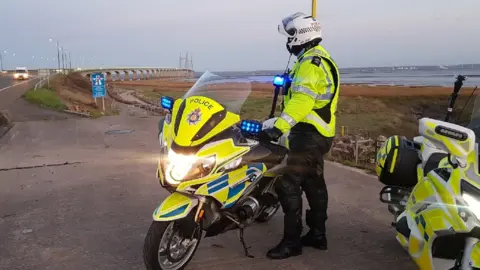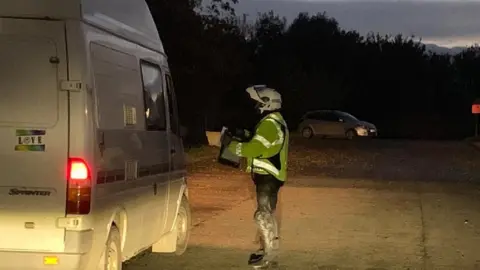Covid: Policing lockdown 'challenging' because of public's 'fatigue'
 Gwent Police
Gwent PoliceWales' second national lockdown is more challenging to police than the first because people are "fatigued" with Covid, a police chief has warned.
But Dyfed-Powys Police and Crime commissioner said it was important people took "personal responsibility".
Wales entered a national 17-day lockdown at 18:00 BST on Friday.
People can leave home for limited reasons, including to provide care, buy food and medication, exercise, or work if they cannot do so from home.
A further 16 deaths of people with coronavirus were reported in Wales on Saturday - the highest total since 28 May - while 1,324 more people tested positive.
All but essential shops have closed and on Friday supermarkets began covering up non-essential goods, which the Welsh Retail Consortium labelled an "ill-conceived policy".
First Minister Mark Drakeford has said supermarkets should also stop selling items such as clothes as a matter of "fairness" to non-essential shops that have closed.
However a Senedd petition against the move has become the fourth-ever to be signed by more than 45,000 people, and will be considered for a debate in the Welsh Parliament.
Jodi Merry, from Rhondda Cynon Taf, said the ban has come at an awkward time as she was planning to buy new clothes, including winter pyjamas, for her eight-year-old son after she gets paid next week.
"Everything is essential when it's something you desperately need," she said.

Travel into or out of Wales to go on holiday or to visit a second home is illegal under the rules, and people are being told only to travel for "essential reasons".
Dyfed-Powys Police and Crime commissioner Dafydd Llywelyn said: "The public... I guess there's fatigue that has set in in relation to the rules and regulations.
"Which is why it's really important we get the message out for people to take personal responsibility."
He said officers would be engaging and educating the public in the first instance and enforcement would only happen at the "latter stage of that process".
Extra powers
Meanwhile, the Law Society of England and Wales, which represents solicitors, said it was keen to make people aware of the powers that enforcement officers have during the firebreak.
It said police had the power to enter homes and other premises if they have reasonable grounds for suspecting that the lockdown restrictions are being contravened or are about to be contravened.
Its president David Greene said: "These are extraordinary powers and it is important that the public are fully informed about them so that they don't fall foul of them inadvertently.
"It is vital that laws of this nature are both visible and understandable.
"We will be concerned to ensure they are being used in a proportionate fashion."
Responding to these concerns, Mr Llywelyn said: "I think it's really important for the police to act in a proportionate way.
"We mustn't also forget that we're in an emergency situation with this being a global pandemic so these are short-term measures that are here to safeguard the communities across the whole of Wales."
Proactive patrols
 Gwent Police
Gwent PoliceDyfed-Powys Police tweeted it was not patrolling the border with England, but officers were out across the road network and in communities.
"Truth be told, we're really hoping that we can all work together to do what we've been asked to do," it added.
Allow X content?
Gwent Police tweeted its motorcyclists had carried out proactive patrols on Friday night.
It said it stopped 10 "vehicles of interest", issued six fixed penalty tickets for breach Covid regulations and arrested a driver for driving while under the influence of cannabis.
Allow X content?
People can be issued a fixed penalty notice "for most types of breaches" and fined £60 for the first offence.
That fine is increased to £120 for a second offence and continues to double for repeated offences, up to a maximum of £1,920. If prosecuted, however, a court can impose an unlimited fine.
How do police enforce Covid rules?
Enforcing the restrictions puts huge pressure on police resources. Crime has returned to levels last seen before the March lockdown - which means the frontline is stretched once more.
Chief constables in England and Wales have received an extra £30m to pay for overtime costs.
But to limit demands on officers, a policing model they call "The Four Es" remains in place.
Before fines are issued to rule-breakers, police will first take a number of steps:
- Engage with people to ask why they appear to be breaking the rules
- Explain the law, stressing the risks to public health and the NHS
- Encourage them to change their behaviour

Find out how the pandemic has affected your area and how it compares with the national average:
